北京嘉学大学法语与习题集第10章间接引语
- 格式:doc
- 大小:73.50 KB
- 文档页数:7
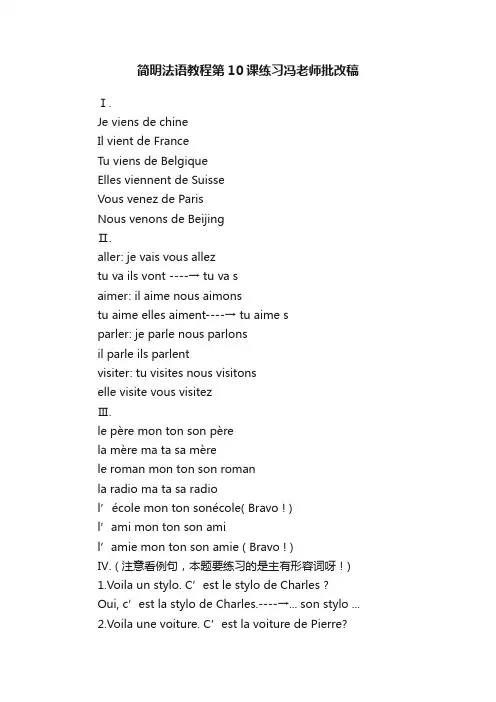
简明法语教程第10课练习冯老师批改稿Ⅰ.Je viens de chineIl vient de FranceTu viens de BelgiqueElles viennent de SuisseVous venez de ParisNous venons de BeijingⅡ.aller: je vais vous alleztu va ils vont ----→ tu va saimer: il aime nous aimonstu aime elles aiment----→ tu aime sparler: je parle nous parlonsil parle ils parlentvisiter: tu visites nous visitonselle visite vous visitezⅢ.le père mon ton son pèrela mère ma ta sa mèrele roman mon ton son romanla radio ma ta sa radiol’école mon ton sonécole( Bravo ! )l’ami mon ton son amil’amie mon ton son amie ( Bravo ! )Ⅳ. ( 注意看例句,本题要练习的是主有形容词呀!)1.Voila un stylo. C’est le stylo de Charles ? Oui, c’est la stylo de Charles.----→... son sty lo ...2.Voila une voiture. C’est la voiture de Pierre?Oui, c’est la voiture de Pierre. ----→... sa voiture ...3.Voila des revues. Ce sont les revues de Jaques?Oui, ce sont les revues de Jaques. ----→... ses revues ...4.Voila des manteaux. Ce sont les manteaux de René et de Marie?Oui, ce sont les manteaux de René et de Marie.----→... leurs manteaux ...5.Voila des journaux. Ce sont les journaux de Pascal?Non, ce ne sont pas les journaux de Pascal.----→... ses journaux ...后边自己做吧, s’il vous pla?t!6.Vo ila une guitare. C’est la guitare de Sophie?Non, ce n’est pas la guitare de Sophie.7.Voila des robes. Ce sont les robes de Sophie et des Nathalie?Oui, ce sont les robes de Sophie et de Nathalie.8.Voila des letters. Ce sont les letters de Pierre?Non, ce ne sont pas les letters de Pierre.Ⅴ.1.J’ai un frère.Je n’ai pas de frère.2.Nous avons des cours aujourd’hui.Nous n’avons pas de cours aujourd’hui.3.Ils font des exercices.Ils ne font pas de exercices. ----→...d’exercices ... (元音省略)4.Les étudiants ont des professeurs fran?ais.Les étudiants n’ont pas de professeurs frqn?ais.5.Elle a des amis fran?ais.Elle n’a pas de amis fran?ais. ----→... d’amis ... (元音省略)6.Il amie le fran?ais.Il n’amie pas le fran?ais.----→动词aimer,名词ami, e 注意不要混淆两词的拼法,发音不同,所以写法语的时候要同时读,这样就会帮助发现拼写错误,那就请自己改正此句里的错误吧。
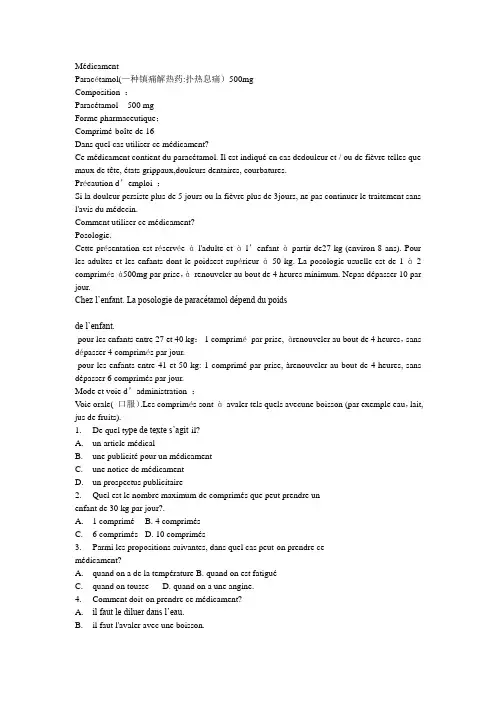
MédicamentParacétamol(—种镇痛解热药:扑热息痛)500mgComposition :Paracétamol 500 mgForme pharmaceutique;Comprimé-boîte de 16Dans quel cas utiliser ce médicament?Ce médicament contient du paracétamol. Il est indiqué en cas dedouleur et / ou de fièvre telles que maux de tête, états grippaux,douleurs dentaires, courbatures.Précaution d’emploi :Si la douleur persiste plus de 5 jours ou la fièvre plus de 3jours, ne pas continuer le traitement sans l'avis du médecin.Comment utiliser ce médicament?Posologie.Cette présentation est réservée àl'adulte et àl’enfant àpartir de27 kg (environ 8 ans). Pour les adultes et les enfants dont le poidsest supérieur à50 kg. La posologie usuelle est de 1 à2 comprimés à500mg par prise,àrenouveler au bout de 4 heures minimum. Nepas dépasser 10 par jour.Chez l’enfant. La posologie de paracétamol dépend du poidsde l’enfant.-pour les enfants entre 27 et 40 kg:1 comprimépar prise, àrenouveler au bout de 4 heures,sans dépasser 4 comprimés par jour.-pour les enfants entre 41 et 50 kg: 1 comprimé par prise, àrenouveler au bout de 4 heures, sans dépasser 6 comprimés par jour.Mode et voie d’administration :V oie orale( 口服).Les comprimés sont àavaler tels quels avecune boisson (par exemple eau,lait, jus de fruits).1. De quel ty pe de texte s’agit-il?A. un article médicalB. une publicité pour un médicamentC. une notice de médicamentD. un prospectus publicitaire2. Quel est le nombre maximum de comprimés que peut prendre unenfant de 30 kg par jour?.A. 1 compriméB. 4 comprimésC. 6 comprimésD. 10 comprimés3. Parmi les propositions suivantes, dans quel cas peut-on prendre cemédicament?A. quand on a de la températureB. quand on est fatiguéC. quand on tousseD. quand on a une angine.4. Comment doit-on prendre ce médicament?A. il faut le diluer dans l’eau.B. il faut l'avaler avec une boisson.C. il faut le mélanger avec un aliment.D. il faut le laisser fondre dans la bouche5. Si la douleur ou la fièvre ne passent pas, que faut-il faire?A. jeter les médicamentsB. appeler les pompiersC. prendre un autre médicamentD. consulter un médecin这是一篇药品说明书,介绍了药品的主要成分是扑热息痛,是一种药片^它的功效是解热镇痛,如头痛、牙痛、肌肉痛、感冒等,此外文章还介绍了食用此药片的一些注意事项以及成人与儿童的用量等。
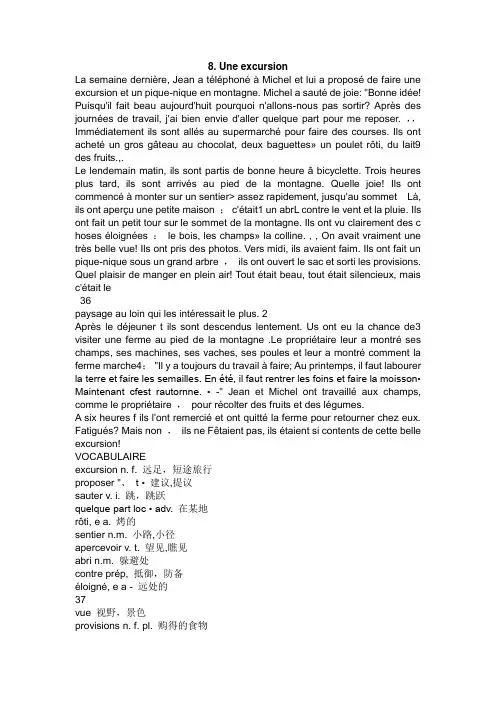
8. Une excursionLa semaine dernière, Jean a téléphoné à Michel et lui a proposé de faire une excursion et un pique-nique en montagne. Michel a sauté de joie: "Bonne idée! Puisqu'il fait beau aujourd'huit pourquoi n'allons-nous pas sortir? Après des journées de travail, j'ai bien envie d'aller quelque part pour me reposer. ,,Immédiatement ils sont allés au supermarché pour faire des courses. Ils ont achetéun gros gâteau au chocolat, deux baguettes»un poulet rôti, du lait9 des fruits.,.Le lendemain matin, ils sont partis de bonne heure â bicyclette. Trois heures plus tard, ils sont arrivés au pied de la montagne. Quelle joie! Ils ont commencé à monter sur un sentier> assez rapidement, jusqu'au sommet Là, ils ont aperçu une petite maison ;c'était1 un abrL contre le vent et la pluie. Ils ont fait un petit tour sur le sommet de la montagne. Ils ont vu clairement des c hoses éloignées :le bois, les champs» la colline. , , On avait vraiment une très belle vue! Ils ont pris des photos. Vers midi, ils avaient faim. Ils ont fait un pique-nique sous un grand arbre ,ils ont ouvert le sac et sorti les provisions. Quel plaisir de manger en plein air! Tout était beau, tout était silencieux, mais c'était le36paysage au loin qui les intéressait le plus. 2Après le déjeuner t ils sont descendus lentement. Us ont eu la chance de3 visiter une ferme au pied de la montagne .Le propriétaire leur a montréses champs, ses machines, ses vaches, ses poules et leur a montré comment la ferme marche4;"Il y a toujours du travail à faire; Au printemps, il faut labourer la terre et faire les semailles. En été, il faut rentrer les foins et faire la moisson• Maintenant cfest rautornne. • -" Jean et Michel ont travailléaux champs, comme le propriétaire ,pour récolter des fruits et des légumes.A six heures f ils l'ont remercié et ont quitté la ferme pour retourner chez eux. Fatigués? Mais non ,ils ne Fêtaient pas, ils étaient si contents de cette belle excursion!VOCABULAIREexcursion n. f. 远足,短途旅行proposer "、t • 建议,提议sauter v. i. 跳,跳跃quelque part loc • adv. 在某地rôti, e a. 烤的sentier n.m. 小路,小径apercevoir v. t. 望见,瞧见abri n.m. 躲避处contre prép, 抵御,防备éloigné, e a - 远处的37vue 视野,景色provisions n. f. pl. 购得的食物en plein air 在户夕卜,在野夕卜intéresser v.i. 使感兴趣;引起注意ferme n.f. 农场,农庄propriétaire " • 所有者,物主;业主vache »./. 母牛labourer t. 耕,耕翻semailles n * f. pl • 播种foin n.m. 干苹;/>/.牧草moisson n>f. 收获,收割;收获物récolter v丄收获,获得NOTES1. était是动词être的未完成过去时单数第三人称,表示过去持续的动作或状态,后面的avait, intéressait也是此类用法。
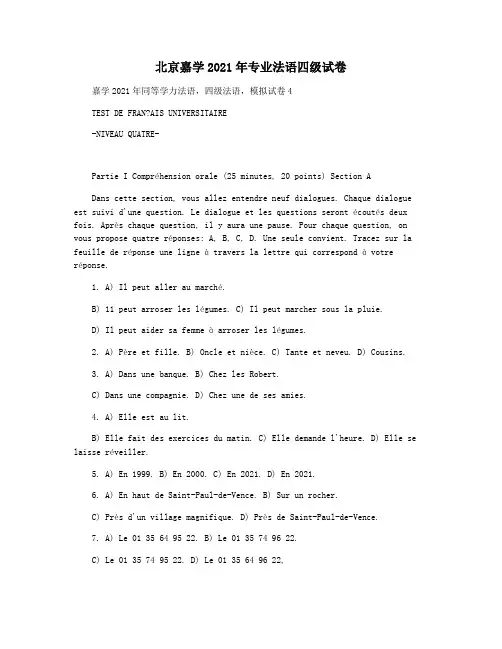
北京嘉学2021年专业法语四级试卷嘉学2021年同等学力法语,四级法语,模拟试卷4TEST DE FRAN?AIS UNIVERSITAIRE-NIVEAU QUATRE-Partie I Compréhension orale (25 minutes, 20 points) Section ADans cette section, vous allez entendre neuf dialogues. Chaque dialogue est suivi d'une question. Le dialogue et les questions seront écoutés deux fois. Après chaque question, il y aura une pause. Pour chaque question, on vous propose quatre réponses: A, B, C, D. Une seule convient. Tracez sur la feuille de réponse une ligne à travers la lettre qui correspond à votreréponse.1. A) Il peut aller au marché.B) 11 peut arroser les légumes. C) Il peut marcher sous la pluie.D) Il peut aider sa femme à arroser les légumes.2. A) Père et fille. B) Oncle et nièce. C) Tante et neveu. D) Cousins.3. A) Dans une banque. B) Chez les Robert.C) Dans une compagnie. D) Chez une de ses amies.4. A) Elle est au lit.B) Elle fait des exercices du matin. C) Elle demande l'heure. D) Elle se laisse réveiller.5. A) En 1999. B) En 2000. C) En 2021. D) En 2021.6. A) En haut de Saint-Paul-de-Vence. B) Sur un rocher.C) Près d'un village magnifique. D) Près de Saint-Paul-de-Vence.7. A) Le 01 35 64 95 22. B) Le 01 35 74 96 22.C) Le 01 35 74 95 22. D) Le 01 35 64 96 22,8. A) Oui, la couleur lui pla?t un peu. B) Oui, la robe est assez grande.C) Non, elle n,aime pas la couleur. D) Non, la taille ne lui convient pas.9. A) Ils sont noirs. B) Ils sont bleus. C) Ils sont gris. D) Ils sont bruns.Section BDans cette section, vous allez entendre deux petits textes. Chaque texte est suivi de trois questions.. Les textes et les questions seront écoutés deux fois. Il y aura une pause après chaque question. Donnez la réponse comme vous avez fait pour la section A.Texte 110. A) Il peut faire du sport après la classe. B) Il est devenu sportif professionnel.C) Il joue au football toujours avec ses amis.D) Il va à la plage ou fait une promenade en bateau.11. A) Il fait du football, du basket-ball et du tennis. B) Il fait dutennis, de la course et du bateau. C) Il fait du tennis et du football.D) Il fait de la promenade, du volley-ball et du tennis.12. A) Trois à cinq heures. B) Sept heures.C) Sept à neuf heures. D) Deux heures.Texte 213. A) Elle est déjà agée.B) Son mari est malade et habite à l'h?pital. C) Ses enfants font encore leurs études. D) L'entreprise ne fonc tionne plus.14. A) Elle travaille, elle vit de son salaire. B) Elle re?oit une sommed'argent d'Etat.C) Elle travaille chez quelqu'un pour gagner la vie.D) Son fils gagne de l'argent pour toute la famille.15. A) 15 ans. B) 17 ans. C) 18 ans. D) 20 ans.Section CDans cette section, vous allez entendre un petit texte. Le texte seraécouté deux fois. Mais il manque quelques mots ou expressions. Eoutez-le et remplissez les blancs.C'est bien bizarre, et contraire à beaucoup d'autres pays, la France(S1)_____à refuser l'ouverture des magasins le dimanche. On (S2)_____bien pourquoi !En effet, quand les cinémas, les restaurants... ouvrent (S3)_____,c'est normal. Est-ce qu'il y a des (S4) _____entre ceux qui travaillent ausup ermarché et ceux qui travaillent dans les restaurants... ? Vraiment, on ne voit pas. Est-ce que les (S5)______peuvent aussi fermer le dimanche ? Les infirmières, elles aussi, ont le (S6)______de passer leur dimanche en famille !Et puis, (S7)_____un peu : comment font les personnes qui travaillent dulundi au samedi pour faire leurs (S8)______? Il n'est pas certain qu'elles aient envie d'aller dans les supermarchés le soir, à (S9)______heures. Beaucoup de Fran?ais en demandent la cause, personne n'a jamais fourni une (S 10)______ convaincante.Partie II Compréhension écrite (25 minutes, 30 points)Lisez les textes suivants et répondez aux questions. Pour chaque question, on vous propose quatre réponses: A, B, C, D. Une seule convient. Tracez sur la feuille de réponse une ligne à travers la lettre qui correspond à votreréponse.Texte 1Une souffrance que rien ne peut guérirJe m'appelle Fran?oise. Je suis née en 1943 à Paris, abandonnée et placée aux foyers de la Ddass (收容院),puis dans différentes familles d'accueil.Même lors de mon mariage, alors qu'il fallait remplir tous ces papiers d'état civil (户籍证件),l'idée de chercher mes origines ne m'a pas touchée.J'oserais même dire que ma situation me plaisait bien, je sentais libre de mener ma vie comme je l'entendais à une époque où les jeunes avaient moins de liberté que maintenant...Pourtant, dès que j'ai su que j'attendais un enfant,je n'ai plus cessé de penser à ma propre naissance. Après la naissance de mon fils, les choses ont semblé aller mieux. Mais cela a été pire lors de madeuxième grossesse (怀孕). Surtout quand j'ai su que le bébé était une fille :je n'en voulais p as, j'étais s?re que je ne pourrais pas r aimer commej'aimais mon fils. Heureusement avec l'aide de mon médecin, j'ai pu enfin comprendre que je nevoulais pas de ma fille parce que ma mère n'avait pas voulu de moi. Je me croyais libre et heureuse, j'avais simplement effacé une souffrance que je savais ne jamais pouvoir guérir. Plus tard j'ai fait des recherches sur mes origines, mais ma mère avait accouché sous X (匿名分娩)et il n'y avait rien dans mon dossier. Aussi suis-je tout à fait contre cette forme de loi, carl'enfant ne devrait jamais avoir à payer pour la faute de ses parents.16. Fran?oise veut exprimer ici son point de vue sur A) l'accouchementsous X de sa propre mère.B) la forme de loi concernant les enfants abandonnés . C) la vie au xfoyers de la Ddasse.D) la loi concernant r accouchement sous X.17. Selon le texte, Fran?oise a-t-elle voulu savoir ses origines avant la naissance de son fils ?A) Oui, elle voulait savoir ses origines quand elle voulait se marier.B) O ui, elle a cherché ses origines, mais elle n'a rien trouvé dans son dossier. C) Non, elle n'y a jamais pensé. D) Non, elle n'osait pas le faire.18. Quelle phrase du texte dit qu'elle vivait heureuse sans savoir les origines de famille ?A) J'oserais même dire que ma situation me plaisait bien, je sentais libre de mener ma vie.B) J'avais simplement effacé une souffrance que je savais ne jamaispouvoir guérir.C) A une époque où les jeunes avaient moins de liberté que maintenan t. D) Après la naissance de mon fils, les choses ont semblé aller mieux.19. ?Je n'en voulais pas? veut dire qu'elle A) ne voulait pas de cette situation. B) ne voulait pas avoir d'enfants. C) ne voulait pas accepter cette fille.D) ne pouvait pas aimer sa fille comme elle aimait son fils. 、20. Que signifie ?payer? dans la phrase ?car l'enfant ne devrait jamais avoir à payer pour la faute de ses parents ?? A) Nourrir ses parents plus tard.B) Rendre ce que ses parents ont payé.C) Prend re la responsabilité de la faute de. ses parents. D) Régler des comptes pour ses parents.Texte 2Le sport en FranceLe sport est un outil qui permet d'être mieux dans son corps et dans satête. Il est considéré par les Fran?ais comme un loisir plut?t que comme un moyen de compétition. Pour eux : les loisirs sont plus importants et la pratique de tel ou tel sport dépend de l'age.Ces dernières années, la promenade à pied ou à vélo, la natation ou la gymnastique se sont beaucoup développées chez les personnes agées. La pratique d'un sport doux leur permet de garder leur forme physique et de rencontrer des gens.Les enfants, eux ,ont commencé è s'intéresser au sport grace aux médias (媒体),aux marques de vêtements et aux champions. Us sont aussi poussés par leurs parents qui pensent que le sport peut leur apprendre la vie en société, leur apprendre à faire face aux situations difficiles et leur donner de bonnes habitudes de vie. Us adorent le basket-ball, le football ou le tennis...A not re époque, les sports les plus populaires, semblent être ceux quel'on pratique en pleine nature. Celui qui a le plus de pratiquants est la promenade à pied, à vélo, et à cheval. Mais ces derniers temps, il y a unsport qui attire de plus en plus de monde au point de devenir un mode de vie. C'est à la fois un loisir qui permet d'entretenir son corps et un moyen de transport non polluant :le patin à roulettes (旱冰运动).Cette attirance pour le sport est due à la télévision, aux journaux, à la radio qui s'i ntéressent au sport et qui commentent toutes les compétitions.On voit que le sport fait partie de notre vie de tous les jours. Les manifestations sportives qui rassemblent les foules en mélangeant toutes les catégories sociales en sont la plus grande preuve.21. Dans ce texte, on parleA) de F histoire du sport en France. B) de la pratique du sport en France.C) des loisirs préférés des Fran?ais. D) du sport en pleine nature.22. Dans quel but les Fran?ais font-ils du sport ? A) Etre mieux dansleur corps et leur tête.B) Avoir un loisir plut?t que de faire la compétition. C) Avoir un nouveau mode de vie. D) Etre en pleine nature.23. Les enfants font du sport parce qu'ils sont poussés par_____ A) leurs parents et par leur admir ation pour les champions. B) leur propre volonté pour garder la ligne. C) les parents et les médias.D) les compétitions sportives et le transport non polluant.24. Selon le texte, en ce moment, quels sont les sports les pluspratiqués ?感谢您的阅读,祝您生活愉快。
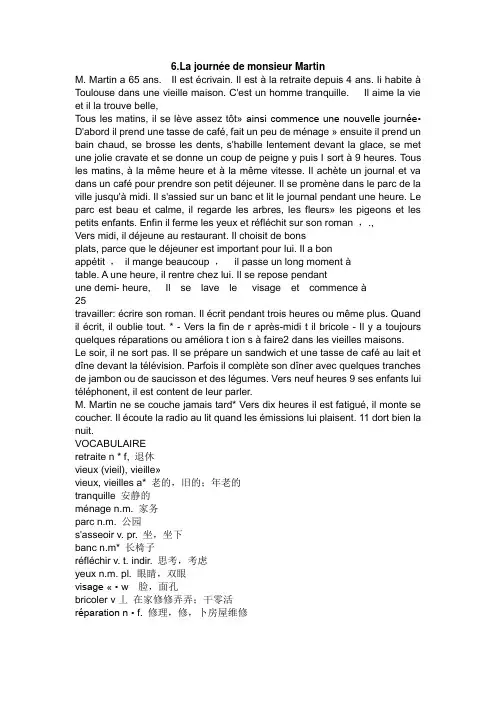
journée de monsieur MartinM. Martin a 65 ans. Il est écrivain. Il est à la retraite depuis 4 ans. Ii habite àToulouse dans une vieille maison. C'est un homme tranquille. Il aime la vie et il la trouve belle,Tous les matins, il se lève assez tôt»ainsi commence une nouvelle journée• D'abord il prend une tasse de café, fait un peu de ménage » ensuite il prend un bain chaud, se brosse les dents, s'habille lentement devant la glace, se met une jolie cravate et se donne un coup de peigne y puis I sort à 9 heures. Tous les matins, à la même heure et à la même vitesse. Il achète un journal et va dans un café pour prendre son petit déjeuner. Il se promène dans le parc de la ville jusqu'à midi. Il s'assied sur un banc et lit le journal pendant une heure. Le parc est beau et calme, il regarde les arbres, les fleurs»les pigeons et les petits enfants. Enfin il ferme les yeux et réfléchit sur son roman ,.,Vers midi, il déjeune au restaurant. Il choisit de bonsplats, parce que le déjeuner est important pour lui. Il a bonappétit ,il mange beaucoup ,il passe un long moment àtable. A une heure, il rentre chez lui. Il se repose pendantune demi- heure, Il se lave le visage et commence à25travailler: écrire son roman. Il écrit pendant trois heures ou même plus. Quand il écrit, il oublie tout. * - Vers la fin de r après-midi t il bricole - Il y a toujours quelques réparations ou améliora t ion s à faire2 dans les vieilles maisons.Le soir, il ne sort pas. Il se prépare un sandwich et une tasse de café au lait et dîne devant la télévision. Parfois il complète son dîner avec quelques tranches de jambon ou de saucisson et des légumes. Vers neuf heures 9 ses enfants lui téléphonent, il est content de leur parler.M. Martin ne se couche jamais tard* Vers dix heures il est fatigué, il monte se coucher. Il écoute la radio au lit quand les émissions lui plaisent. 11 dort bien la nuit.VOCABULAIREretraite n * f, 退休vieux (vieil), vieille»vieux, vieilles a* 老的,旧的;年老的tranquille 安静的ménage n.m. 家务parc n.m. 公园s'asseoir v. pr. 坐,坐下banc n.m* 长椅子réfléchir v. t. indir. 思考,考虑yeux n.m. pl. 眼睛,双眼visage « • w 脸,面孔bricoler v丄在家修修弄弄;干零活réparation n • f. 修理,修,卜房屋维修26amelioration n.f. (对房屋进行的)修缮completer v - i • 丰卜?£,字卜足tranche n • f. 薄片jambon n. m 火腿saucisson n.m. 红肠,灌肠émission n . j\ 广播节目plaire ( + à) t. indir • 使......客欢,使......高兴NOTES1. il la trouve belle. 他认为生活很美好c trouver qch ou qn + a -认为某事物或某人怎么样ô例:Je trouve votre chambre bienclaire,我觉得您的房间很明亮。
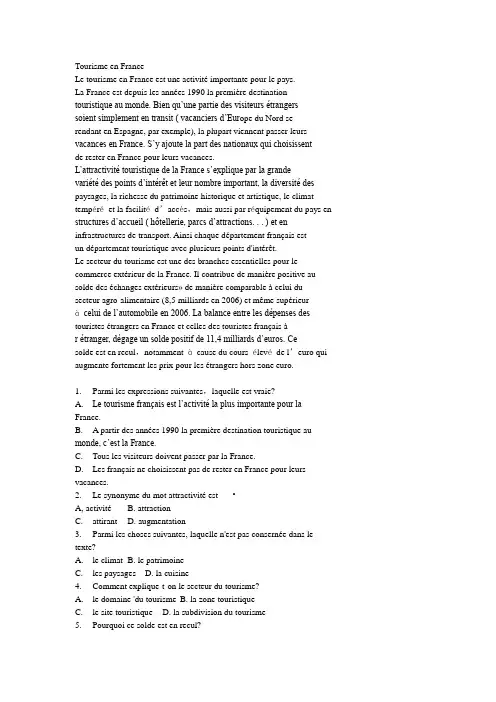
Tourisme en FranceLe tourisme en France est une activité importante pour le pays.La France est depuis les années 1990 la première destination touristique au monde. Bien qu’une partie des visiteurs étrangerssoient simplement en transit ( vacanciers d’Eur ope du Nord serendant en Espagne, par exemple), la plupart viennent passer leurs vacances en France. S’y ajoute la part des nationaux qui choisissentde rester en France pour leurs vacances.L’attractivité touristique de la France s’explique par la grandevariété des points d’intérêt et leur nombre important, la diversité des paysages, la richesse du patrimoine historique et artistique, le climat tempéréet la facilitéd’accès,mais aussi par réquipement du pays en structures d’accueil ( hôtellerie, parcs d’attractions. . . ) et en infrastructures de transport. Ainsi chaque département français estun département touristique avec plusieurs points d'intérêt.Le secteur du tourisme est une des branches essentielles pour le commerce extérieur de la France. Il contribue de manière positive au solde des échanges extérieurs» de manière comparable à celui du secteur agro-alimentaire (8,5 milliards en 2006) et même supérieuràcelui de l’automobile en 2006. La balance entre les dépenses des touristes étrangers en France et celles des touristes français àr étranger, dégage un solde positif de 11,4 milliards d’euros. Cesolde est en recul,notamment àcause du cours élevéde l’euro qui augmente fortement les prix pour les étrangers hors zone euro.1. Parmi les expressions suivantes,laquelle est vraie?A. Le tourisme français est l’activité la plus importante pour la France.B. A partir des années 1990 la première destination touristique au monde, c’est la France.C. Tous les visiteurs doivent passer par la France.D. Les français ne choisissent pas de rester en France pour leurs vacances.2. Le synonyme du mot attractivité est •A, activité B. attractionC. attirantD. augmentation3. Parmi les choses suivantes, laquelle n'est pas consernée dans le texte?A. le climatB. le patrimoineC. les paysagesD. la cuisine4. Comment explique-t-on le secteur du tourisme?A. le domaine 'du tourismeB. la zone touristiqueC. le site touristiqueD. la subdivision du tourisme5. Pourquoi ce solde est en recul?A. Parce que les visiteurs étrangers achètent moins de choses enFrance.B. Parce que le cours élevé de l’euro qui renchérit fortement lesprix pour les étrangers hors zone euro.C. Parce que de plus en plus de français voyagent à l’étranger.D. Parce que le secteur du tourisme de France est en recul.本文是一个法国旅游的概况。
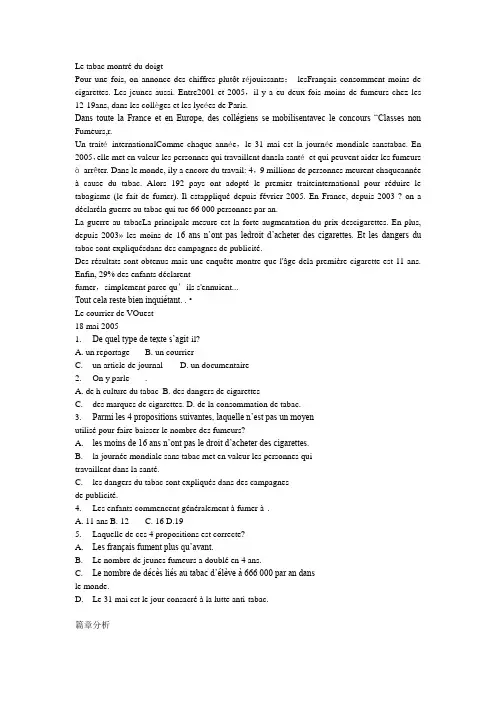
Le tabac montré du doigtPour une fois, on annonce des chiffres plutôt réjouissants:lesFrançais consomment moins de cigarettes. Les jeunes aussi. Entre2001 et 2005,il y a eu deux fois moins de fumeurs chez les 12-19ans, dans les collèges et les lycées de Paris.Dans toute la France et en Europe, des collégiens se mobilisentavec le concours “Classes non Fumeurs,r.Un traitéinternationalComme chaque année,le 31 mai est la journée mondiale sanstabac. En 2005,elle met en valeur les personnes qui travaillent dansla santéet qui peuvent aider les fumeurs àarrêter. Dans le monde, ily a encore du travail: 4,9 millions de personnes meurent chaqueannée àcause du tabac. Alors 192 pays ont adoptéle premier traiteinternational pour réduire le tabagisme (le fait de fumer). Il estappliquédepuis février 2005. En France, depuis 2003 ? on a déclaréla guerre au tabac qui tue 66 000 personnes par an.La guerre au tabacLa principale mesure est la forte augmentation du prix descigarettes. En plus, depuis 2003»les moins de 16 ans n’ont pas ledroit d’acheter des cigarettes. Et les dangers du tabac sont expliquésdans des campagnes de publicité.Des résultats sont obtenus mais une enquête montre que l'âge dela première cigarette est 11 ans. Enfin, 29% des enfants déclarentfumer,simplement parce qu’ils s'ennuient...Tout cela reste bien inquiétant. . •Le courrier de VOuest18 mai 20051. De quel type de texte s’agit-il?A. un reportageB. un courrierC. un article de journalD. un documentaire2. On y parle .A. de h culture du tabacB. des dangers de cigarettesC. des marques de cigarettes.D. de la consommation de tabac.3. Parmi les 4 propositions suivantes, laquelle n’est pas un moyenutilisé pour faire baisser le nombre des fumeurs?A. les moins de 16 ans n’ont pas le droit d’acheter des cigarettes.B. la journée mondiale sans tabac met en valeur les personnes quitravaillent dans la santé.C. les dangers du tabac sont expliqués dans des campagnesde publicité.4. Les enfants commencent généralement à fumer à .A. 11 ansB. 12C. 16D.195. Laquelle de ces 4 propositions est correcte?A. Les français fument plus qu’avant.B. Le nombre de jeunes fumeurs a doublé en 4 ans.C. Le nombre de décès liés au tabac d’élève à 666 000 par an dansle monde.D. Le 31 mai est le jour consacré à la lutte anti-tabac.篇章分析吸烟有害健康,这是尽人皆知的道理。
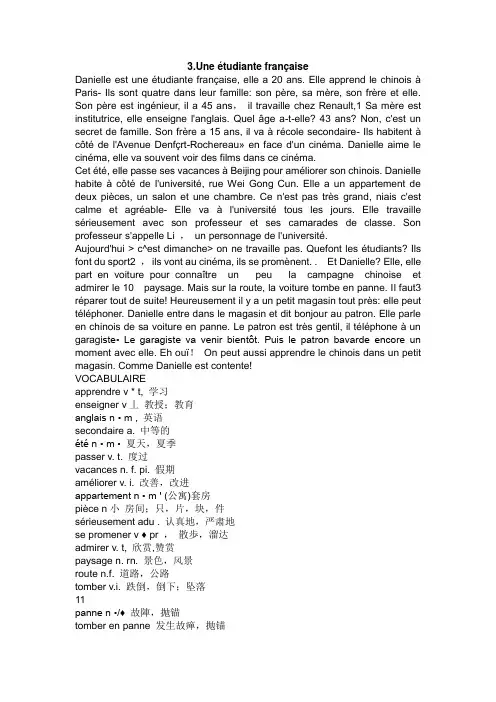
3.Une étudiante françaiseDanielle est une étudiante française, elle a 20 ans. Elle apprend le chinois àParis- Ils sont quatre dans leur famille: son père, sa mère, son frère et elle. Son père est ingénieur, il a 45 ans,il travaille chez Renault,1 Sa mère est institutrice, elle enseigne l'anglais. Quel âge a-t-elle? 43 ans? Non, c'est un secret de famille. Son frère a 15 ans, il va à récole secondaire- Ils habitent àcôté de l'Avenue Denfçrt-Rochereau» en face d'un cinéma. Danielle aime le cinéma, elle va souvent voir des films dans ce cinéma.Cet été, elle passe ses vacances à Beijing pour améliorer son chinois. Danielle habite àcôtéde l'université, rue Wei Gong Cun. Elle a un appartement de deux pièces, un salon et une chambre. Ce n'est pas très grand, niais c'est calme et agréable- Elle va àl'universitétous les jours. Elle travaille sérieusement avec son professeur et ses camarades de classe. Son professeur s'appelle Li ,un personnage de l'université.Aujourd'hui > c^est dimanche> on ne travaille pas. Quefont les étudiants? Ils font du sport2 ,ils vont au cinéma, ils se promènent. . Et Danielle? Elle, elle part en voiture pour connaître un peu la campagne chinoise et admirer le 10 paysage. Mais sur la route, la voiture tombe en panne. Il faut3 réparer tout de suite! Heureusement il y a un petit magasin tout près: elle peut téléphoner. Danielle entre dans le magasin et dit bonjour au patron. Elle parle en chinois de sa voiture en panne. Le patron est très gentil, il téléphone à un garagi ste• Le garagiste va venir bientôt. Puis le patron bavarde encore un moment avec elle. Eh ouï!On peut aussi apprendre le chinois dans un petit magasin. Comme Danielle est contente!VOCABULAIREapprendre v * t, 学习enseigner v丄教授;教育anglais n • m , 英语secondaire a. 中等的été n • m • 夏天,夏季passer v. t. 度过vacances n. f. pi. 假期améliorer v. i. 改善,改进appartement n • m ' (公寓)套房pièce n小房间;只,片,块,件sérieusement adu . 认真地,严肃地se promener v ♦ pr ,散歩,溜达admirer v. t, 欣赏,赞赏paysage n. rn. 景色,风景route n.f. 道路,公路tomber v.i. 跌倒,倒下;坠落11panne n •/♦ 故陣,抛锚tomber en panne 发生故瘅,抛锚réparer H 修理,修复tout de suite toc , adv . 立即,立刻heureusement adv ♦ 幸好,幸而magasin n , m . 商店,铺子garagiste n.m. 汽车修理行经营者bavarder "丄闲谈,闲聊comme ad v ♦ 多么NOTESI. travailler chez Renault在雷诺汽车公司工作2- Ils font du sport,他们做体育活动,du,de la, des是部分冠词,分别用在不可数的阳性、阴性和复数名词前。
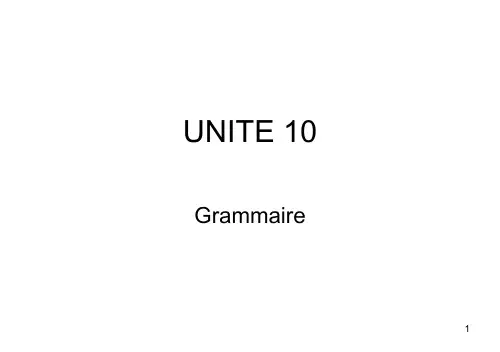
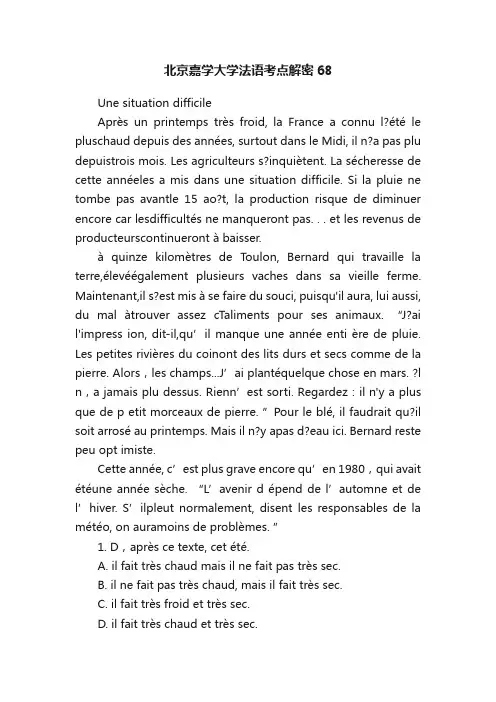
北京嘉学大学法语考点解密68Une situation difficileAprès un printemps très froid, la France a connu l?été le pluschaud depuis des années, surtout dans le Midi, il n?a pas plu depuistrois mois. Les agriculteurs s?inquiètent. La sécheresse de cette annéeles a mis dans une situation difficile. Si la pluie ne tombe pas avantle 15 ao?t, la production risque de diminuer encore car lesdifficultés ne manqueront pas. . . et les revenus de producteurscontinueront à baisser.à quinze kilomètres de Toulon, Bernard qui travaille la terre,élevéégalement plusieurs vaches dans sa vieille ferme. Maintenant,il s?est mis à se faire du souci, puisqu'il aura, lui aussi, du mal àtrouver assez cTaliments pour ses animaux. “J?ai l'impress ion, dit-il,qu’il manque une année enti ère de pluie. Les petites rivières du coinont des lits durs et secs comme de la pierre. Alors,les champs...J’ai plantéquelque chose en mars. ?l n,a jamais plu dessus. Rienn’est sorti. Regardez:il n'y a plus que de p etit morceaux de pierre. ”Pour le blé, il faudrait qu?il soit arrosé au printemps. Mais il n?y apas d?eau ici. Bernard reste peu opt imiste.Cette année, c’est plus grave encore qu’en 1980,qui avait étéune année sèche. “L’avenir d épend de l’automne et de l’hiver. S’ilpleut normalement, disent les responsables de la météo, on auramoins de problèmes. ”1. D,après ce texte, cet été.A. il fait très chaud mais il ne fait pas très sec.B. il ne fait pas très chaud, mais il fait très sec.C. il fait très froid et très sec.D. il fait très chaud et très sec.2. La production risque de diminuer encore car .A. les agriculteurs auront des dif ficultés…B. les agriculteurs auront moins de difficultés.C. les agriculteurs n?auront pas de difficulté.D. les agriculteurs n?auront plus de difficulté.3. Pourquoi Bernard se fait-il du souci?A. parce qu?il travaille la terre.B. parce qu?il a des dif ficultés pour nourrir ses vaches.C. parce qu?il est malade.D. parce qu,il a perdu ses vache.4. Selon Bernard? comme il n’a jamais plu dessus,.A. ce qu?il avait planté est mort.B. personne n?est sorti ailleurs.C. il n?y a rien à sortir.D. on ne peut pas sortir.5. D’après ce que Bernard dit de ses champs,.A. il n?y a plus de petits morceaux de pierre.B. il y a plus de petits morceau de pierre.C. il n?y a que de petits morceaux de pierre.D. il y a beaucoup plus de petits morceaux de pierre.篇章分析本文讲述了对于法国农民来说比较困难的一年:这一年冬天寒冷,夏天炎热干旱。
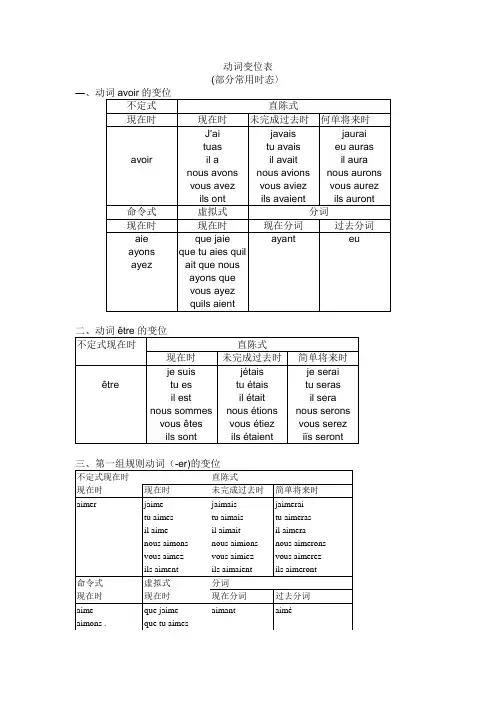
动词变位表(部分常用时态〉―五、第三组动词的变位注:①和acquérir的变位相同的动词有:conquérir, senquérir ,requérir②和courir的变位相同的动词有:accourir, concourir, discourir, parcourir, secourir。
③和cueillir的变位相同的动词有:accueillir, recueUlir.④和dormir的变位相同的动词有:sendormir, mentir, démentir, partir, départir, se repentir, sentir, consentir, pressentir, ressentir, servir, desservir, sortir, ressortir.⑤和ouvrir的变位相同的动词有:entrouvrir, couvrir, découvrir, offrir, souffrir⑥和tenir的变位相同的动词有:sabstenir, appartenir, contenir, détenir, entretenir, maintenir,obtenir,retenir, soutenir⑦和tressaillir的变位相同的动词有:assaillir。
⑧和venir的变位相同的动词有:advenir, convenir, contrevenir, devenir, disconvenir, intervenir, parvenir, prévenir, provenir, revenir, redevenir, se souvenir. subvenir, survenir注:①和mouvoir的变位相同的动词有:émouvoir.②和recevoir的变位相同的动词有:apercevoir, concevoir décevoir percevoir。
24. MontréalMontréal !a près Parts , es£ la plus gra nde vil le franco-phone du monde. Mais ,elle est plus près de New York que de Paris . Et la langue commune qui unit le Québec' à la France sépare aussi les deux pays ... d'au moins 6 000 km !Le Canada compte 24 millions d'habitants* en majoritéanglophones. Les francophones représentent un quart de la population et 5 millions d'entre eux vivent au Québec, la plus grande des provinces du Canada.Le Québec a une grande ville; Montréal,3 millions d'habitants. Montréal est une réalitéàpart3,elle ne représente pas le Québec dans sa totalité. En effet, cette grande ville doit faire face àdes problèmes économiques et linguistiques difficiles.À Montréal, le bilinguisme est une réalité quotidienne pour un grand nombre de ses habitants. Il ne faut pas oublier que les anglophones, majoritaires dans le pays, sont ici peu nombreux. Depuis 1974, le français est la langue officielle du Québec,et Montréal est une ville francophone.124Promenade dans Montréal :des gratte-ciel et des galeries souterrainesC’est une grande ville toute simple , avec une île ( l’Ile Notre-Dame) , une montagne (le Mont-Royal ),un fleuve (le Saint-Laurent) et un métro propre àrimage de la ville.Ici, tout respire un air paisible qu'on ne trouve ni à Paris, ni àNew York. Montréal a également un réseau extraordinaire de galeries souterraines ,avec des magasins, des restaurants, des banques. . . On peut s'y promener àl'abri4des grands froids de l'hiver. La ville est construite en "damier"5 comme les villes d'Amérique du Nord.La rue principale s'appelle ici le Boulevard Saint-Laurent. Pendant longtemps, cette longue rue droite séparait Fest, autrefois surtout francophone t pauvre, avec ses petites maisons en bois; et l'ouest, à majoritéanglophone, riche et commerçant? avec ses belles villas. Ça, c'est le passée Aujourd'hui, le Montréal moderne est devenu un centre d'affaires internationales. Certains affirment :" À part la langue, il n'y a rien de français au Québec. " Bien sûr, c'est seulement un mot pour rire comme les Québécois aiment en faire. Mais, la réalitéest là. Entourés de quelque 250 millions d'anglophones ,en plein sur le continent américain, les francophones ont réussi àdéfendre leur langue et leur culture. Il suffit de pousser le bouton de la tétépour s,en rendre compte. Entre les chaînes canadiennes125anglophones et américaines il est difficile pour la télévision francophone de se faire une place.Québec ;Terre d ^accueil. Montréal :ville cosmopoliteMontréal, c'est aussi un million d'étrangers venant d'une dizaine de pays différents. De plus en plus, la ville devient cosmopolite et ,Italiens, Grecs, Chinois, Vietnamiens... se mêlent et essayent de se comprendre. Alors "speak English?" ou u parlez-vous français?" pour eux aussi, la question se pose. Depuis 1977,selon la loi 101,l'apprentissage de la langue française est obligatoire à tous les immigrants, c’est au Québec qu'ils sont les plus nombreux. Certes f cette loi rencontre quelques difficultés dans son application. Mais depuis, le nombre des étrangers étudiant le français a beaucoup augmenté. Les Québécois ont mis en place5une structure d'accueil très efficace pour tes immigrants.Etre bilingue ,un atout formidableGrâce aux luttes des années 60〜70,les francophones ont maintenant une sécuritéculturelle et linguistique. Mais aujourd'hui, la nouvelle génération s'intéresse moins aux querelles linguistique et politique. Un de ses grands problèmes,c'est actuellement le chômage,très grave au126Québec. Pour un jeune, être bilingue devient parfois un atout supplémentaire. “Les deux communautés trouvent un grand plaisir à vivre ensemble" déclare Bernard, 20 ans. D'ailleurs, les Montréalais disent avec fierté que leur ville est La seule au monde oùil y ait autant de Québécois francophones parlant anglais que de Québécois anglophones parlant français. Far contre, àMontréal,ce sont les anglophones qui découvrent ce que signifie le fait d'être Anglais et Québécois. C'est cela le respect des minorités!VOCABULAIREfrancophone a . 9 n . 讲法语的(人〉anglophone a. n . 讲英语的(人)linguistique a . 语言的bilinguisme n. m. 双语gratte-ciel n. m . inv. 摩天大楼galerie n.f 商城;画廊villa n.f 别墅Québécois, e n . 魁北克人cosmopolite a . 国际性的apprentissage n . m . 学习immigrant, e n 移民bilingue a . 讲两种语言的,会双语的atout n . m . 王牌communauté n .f . 社会团体2minoritén .f . 少数,少数派NOTES1. Montréal [moreal]蒙特利尔。
Guerre de Cent Ans en NormandieLa guerre de Cent Ans est un conflit qui s’inscrit dans unepériode de mutation:ranci en ordre féodal est de moins en moins enmesure de répondre aux besoins de la société. Il sc dessine à cettepériode, une nouvelle carte de r Europe où des États puissants et moderness’affirment entre eux et vis-à-vis de la papauté. L’accroissement deséchangés sur l'Atlantiquc et la Manche fait que l’Angleterre tente dese construire autour de la Manche alors que la France se construitautour de ses grands bassins fluviaux? comme la Seine. Dès lors,sila Normandie, àla rencontre de ces deux zones, devient une desregions les plus riches d’Europe, elle devient du même coup unenjeu majeur pour les deux puissances.La Normandie joue un rôle important durant la guerre de CentAns ( 1337-1453). Si elle n’est pas àl'origine du conflit,elle devientrapidement un enjeu entre le roi d'Angleterre et le roi de France. La richessede la Normandie» son passé commun avec les Anglais (avant 1204, le duchéde Normandie et le royaume d1 Angleterre avaient le même maîtr e), saproximité géographique avec l’île explique cette situation particulière. Deux périodes se dégagent dans cette guerre de Cent Ans:Dansun premier temps, l^intervention des Anglais est épisodiquepuisqu’ils se contentent de lancer des chevauchées destr uctrices àtravers la région. Toutefois,un puissant seigneur normand, Charlesle Mauvais, par son ralliement(归顺)àl’Anglais, allume une guerrecivile qui oppose les Normands entre eux. Dans un second temps, laprésence anglaise est beaucoup plus pesante puisqu’ils occupent la région pendant plus de trois d écennies ( 1417-1450). En 1420,letraité de Troyes fait du roi d'Angleterre l’héritier du royaume deFrance. La Normandie apparaît alors comme l’élément central de la Franceanglaise. Finalement, le roi de France Charles VII reconquiert la richeprovince et pardonne aux Normands qui ont collaboré avec r ennemi. LaNormandie retrouve la paix mais sort très affaiblie du conflit.1. Quel est le sens de Dès lors?A. dès ce momentB. dès lors queC. dès queD. lorsque2. Le lieu clé de la guerre de Cent Ans est .A. ]a MancheB. F AtlantiqueC. la SeineD. la Normandie3. Parmi les quatre phrases suivantes sur la Normandie, laquellen’est pas vraie?A. La Normandie joue un rôle important durant la guerre de Cent Ans.B. La Normandie était très riche.C. Après la guerre de Cent Ans, la Normandie devient plus forte.D. Avant 1204, le duché de Normandie et le royaume d’Angleterreavaient le même maître.4. Pourquoi dans un premier temps, l’intervention des Anglaisest épisodique?A. Parce que la résistance des français est épisodique.B. Parce qu’ils se contentent de lancer des chevauchées destructrices àtravers la Normandie.C. Parce qu,ils ont signéles traités épisodiques.D. Parce que la puissance financière d’Angleterre était faible.5. La signature du traité de Troyes déclare que •A. la France est sous la reigne du roi d1 Angleterre.B. la guerre de Cent Ans est finie.C. la Norman die collabore avec l’ennemi.D. r ancien ordre féodal est fini.本文是历史事件介绍:英法百年战争。
第2章品质形容词(Ladjectif )品质形容词的性、数与它所修饰的名或代词的性、数一致:1. 一般情况下,阴性形容词的构成就是在阳性形容词的词尾加-e,masculinPaul est grand, 保尔个子高大。
Eric est marié. 埃里克已结婚了。
Marc est original. 马克的性格很古怪。
Sophie est grande. 索菲个子髙大。
Marie est mariée. 玛丽已结婚了。
Cathy est originale.,的性格很古怪。
.注意①如果阳性形容词以-e结尾,阴性形容词形式与阳性形式相同:André est suisse. 安德烈是瑞士人。
Annie est suisse. 安妮是瑞士人。
②当阳性形容词以一个不发音的辅音t, d,s结尾时,阴性形容词中的该辅音就要发音,因为词尾加了一个-e:François est grand ,blond et intelligent.弗朗索瓦个子髙大,金黄色的头发,很聪明。
Françoise est grande, blonde et intelligente弗朗索瓦丝个子高大,金黄色的头发,很聪明。
2. 以-an,-en, -on, -il和-el结尾的阳性形容词,变成阴性形式时,要先双写词尾辅音再加-eGiorgio est italien. Bruna est italienne,Fabien est mignon, Elodie est mignonne (可爱的)-Alain est poncturel. Corinne est poncturelle(准时的),Il aime le métier paysan. Cest une famille paysanne.3, 有时阳性形容词和阴性形容词的词尾不同Cathy est sportive. Marie est sérieuse.Elodie est rêveuse (爱幻想的) Sophie est menteuse.Rose est calculatrice (会计算的) Marc est sportif.Paul est sérieux Fabien est.rêveurEric est menteur. Paul est calculateur-4,特殊形式的形容词beau―belle nouveau―nouvelle faux―fausse doux―douce roux―rousse jaloux―jalouse neuf ― neuve vieux—vieille gros―grosse bas―basse fou―folle long—longue frais——fraiche sec―sèche grec―greegue blanc―blanche二、形容词数的变化1. 一般来讲,形容词复数的构成是在单数形式后加-s单数:Cette classe est grande. 这个教室很大。
Ce monde aimable dont rêvent les âmes sensiblesEssayons un instant, en effet, d’imaginer ce monde oùlesintentions premières seraient réalisées. La maladie et la souffranceont disparu. Les famines et les épidémies appartiennent au passé. Lam édecine n,est plus que préventive(l) . Pour faire bonne mesure, onpeut même ajouter que les hommes sont àl’abri du besoin(2),qu’ilstravaillent sans excès et qu’ils sont protégés contre tout ce qui peutnuire àleur bien-être et àleur confort. La pollution a disparu, onrase gratis, le sommeil est réparateur, la saiitééclate sur tous lesvisages, dans son paradis retrouvé, r homme n,a plus motif de seplaindre et par conséquent perd peu àpeu son agressivité; il vitdésormais, heureux et fraternel, dans une sociétésans conflit.Ce conte de fées, vers lequel, sans le dire nous ne cessons detendre, ce monde suave (美妙的,甜蜜的)que nous tenonsinconsciemment ou non, comme le but de notre démarche, est unballon rose (3) qu’il faut malheureusement crever,il est essentield’apercevoir a temps que ce paradis pour lequel nous croyons nousbattre constitue un objectif tout àfait irréel, incompatible avec lesdonnées de base de la vie humaine. L’anxiété, la douleur morale,l’agressivité,la sensation d’être mal dans sa peau, le mécontentementsont àr évidence des caractères propres de l’homme,qui ne d épendent quetrès partiellement des événements extérieurs.1. “La médecine n’est plus que préventive”signifie:.A. La médecine est devenue inutile.B. La médecine emploie uniquement des méthodes douces.C. La médecine a uniquement pour fonction d'empêcher les maladies.D. La médecine ne sera pas aussi importante qu’aujourd’hui.2. “Etre àl’abri du besoin”veut dire ici:.A. avoir de quoi vivreB. éprouver le besoin d,un abriC. vivre aux dépens des autresD. on ne peut plus être riche3. “un ballon rose” signifie ici.A. un signe de bonheurB. un ballon de couleur roseC. quelque chose qui porte malheurD. une illusion merveilleuse4. D’après l,auteur,le monde sans souffrance .A. est réalisable.B. n’est pas réalisable.C. est réalisable mais ne peut durer longtemps.D. n’est pas le but de la démarche des hommes.5. D’après le texte, l'anxiété, la douleur morale, l,agressivité,etc.proviennent .A. uniquement des caractères propres de l’homme.B. surtout des événement extérieurs.C. un peu seulement des caractères propres de l’homme.D. un peu des événements extérieurs.这篇短文的第一段为我们勾画了一个幻想中的世界:没有疾病,没有苦痛,没有悲伤,没有战争。
第10章间接引语(Le distours indirect) 法语中原封不动地引用或复述别人的原话叫做直接引语, Maman me dit : Tu dois faire attention, 妈妈对我说:你应该小心。 Je vais chez mon ami, Lui dis-je,我对他说:我去朋友家 用自己的话进行,,叫做间接引语。直接引语变为间接引语,多数情况下为宾语从句,由demander, ignorer, savoir, dire, répondre, ajouter, affirmer, expliquer, annon。er等动词力n que引导 Le professeur nous dit: Vous devez étudier cette leçon pour demain, Linsperteur viendra un de ces jours Les examens approchent/ 老师对我们说: 你们应预习明天要上的课。 检查员这几天要来。 考试临近了 。 Le professeur nous dit que nous devons étudier cette leçon pour demain. que rinsperteur viendra un de ces jours, que les examens approchent. 老师对我们说应预习明天要学的课。 检査员这几天要来。 考试临近了。 On me dit quil partira demain. 别人告诉我他明天走。 ll affirme que c’est vrai. 他肯定这是真的
一、间接引语的基本用法 1,直接引语如果是一般疑问句,变为间接引语时,应用连词si来引导从句 Est-ce que tu seras prêt à 6 heures? 你6点钟会准备好吗? ll demande si tu seras prêt à 6 heures. 他问你是否在6点钟准备好。 Est-。e que ça vient dAmérique? 这来自美国吗? Elle veut savoir si ça vient dAmérique.她想知道这是否来自美 T\i ne viens pas? 你不来吗? Mon frère me demande si je ne viens pas. 我兄弟问我是否不来。 Es-tu malade?你生病了吗? Il me demande si je suis malade. 他问我是否生病了
2.直接引语如果是特殊疑问句,变为间接引语时,仍保原来的疑问词用以引导从句 Quand pars-tu? 你何时走? Elle demande quand tu pars. 她问你何flt走。 Où allez-vous? 您去哪儿? Il veut savoir où vous allez.他想知道您到哪儿去。 combien est-ce que ça coûte? 多少钱? Il demande combien ça coûte. 他问多少钱。 combien de livres as,tu 3us?你读过多少书? Il demande à son ami combien de livres il a lus, 他问他的朋友读过多少书。 Quelle veste tu porteras? 你将穿什么上衣? ll veut savoir quelle veste tu porteras.他想知道你将穿什么上衣。 Qui est venu chez toi? 谁来过你家 ll demande à son ami qui est venu chez lui.他问朋友谁来过他家。 Pourquoi es-tu triste? 你为什么伤汔? H me demande pourquoi je suis triste. 他问我为什么伤心 De quoi as-tu besoin?你需要什么? ll demande à sa femme de quoi elle a besoin,他问他妻子需要什么。 3. 以疑问词quest-ce qui, que, qu,est。e que引导的疑问i变为间接引语时,分别为cequi, ce que, ce que Que fais-tu là? 一在那儿干什么? Je lui demande ce quil fait là,我问他在那儿干什么 Quest-ce que tu fais? 你干什么? Elle lui demande ce quil fait. 她问他干什么。 Quest-ce qui sest passé? 发生什么事了? Ils veulent savoir ce qui sest passé, 他们想知道生什么事了 。 4, 当以动词dire, demander引导的直接引语为陈述句,变为间接引语时,用que引出宾语从句,也可用de引出不定式 ll dii: Je reviendrai dans 2 heures, 他说:我两小时后回来 Il dit quil reviendra dans 2 heures. 他说他两小时后回来 Elle dit: Je lappelle plus tard. 她说:我过一会儿给他打电话 Elle dit de lappeler piur tard,她说她过一会儿给他打电话。 5,当直接引语为命令句,变为间接引语时,应将命令句变为不定式或以从属连词que引导的从句,从句谓语用虚拟式 Parlez moins fort! 小声点! Il a dit de parler moins fort 他说小声点. Maman nous dit: Aidez-moi! 妈妈对我们说:帮帮我! Maman nous dit de laider. 妈妈要我们帮帮她。 Maman nous dit; “Attendez-moi une minute,”妈妈对我们说:等我一会儿。 Maman nous dit de lattendre une minute. 妈妈要我们等她一会儿。 Il dit: Tout le monde prendra soin de ces papiers/ 他说:大家要注意保管这些文件。 Il dit que tout le monde prenne soin de ces papiers. 傅叫大家注意保管这些文件。 6.直接引语变为间接引语时,原有的人称代词或主有代词、主有形容词都要作相应的变化 1) 直接引语中主语为第一人称时,间接引语中的主语应为第三人称 Il dit: Je suis chinois. 他说:我是中国人。 I dit quil est chinois. 他说他是中国人。 2) 直接引语中主语为第二人称时,间接引语的主语为第一 Vous viendrez ave。 vos amis?你们将和你们的朋友们一块来吗? Il veut savoir si nous viendrons avecnos amis. 他想知道我们是否和朋友们一起来。 3) 直接引语中主语为第三人称时,在间接引语中不变 Il dit: Elle est très gentille 他说她很可爱。 ll dit quelle est très gentille.他说她很可爱。 7.直接引语变为间接引语时,可引起语式的变化 Je promets que je le ferai. 我答应做这件事。 Je promets de le faire.我答应做这件事。(转换为不定式) llordonne de le faire.他命令做这件事。 ll ordonne que tu le fasses.他命令你。(转换为虚拟式) 8,间接引语中主语的位置 1) 主语是人称代词或ce, on时,主语在动词前 Je me demande de quoi tu parles. avec qui vous allez jouer, où Ton vend ce livre, quand cest ton anniversaire. 我自问你在说什么。 你和谁去玩。 在明哪卖这本书 你的生日是何时 2) 主语是名词或其他代词时,主语放动词前 Je me demande de quoi ton père parle souvent. .. avec qui ton frère va jouer dans la rue. où maman a trouvéce livre, quand nos amis reviendront de leur voyage comment les autres trouveront ce projet 我自问你父亲经常讲什么。 你兄弟和谁去街上玩。 妈妈在哪儿找到这本书的。 我们的朋友何时旅游归来。 其他人将怎样看待这个计划。
.注意 如果间接引语的谓语后没有表语或宾语,主语可以放在动词前面,也可放在动词后面。 Je me demande de quoi ton père parle. Ou : de quoi parle ton père. Je me demande avec qui ton frère va jouer. Ou : avec qui va jouer ton frère. Je me demande où maman va. Ou: où va maman. Je me demande quand les autres viendront. Ou : quand viendront les autres.
二、间接引语中的时态配合